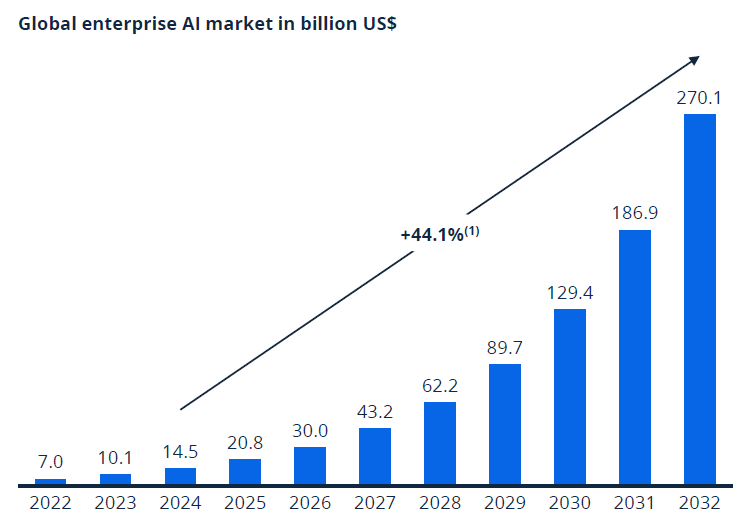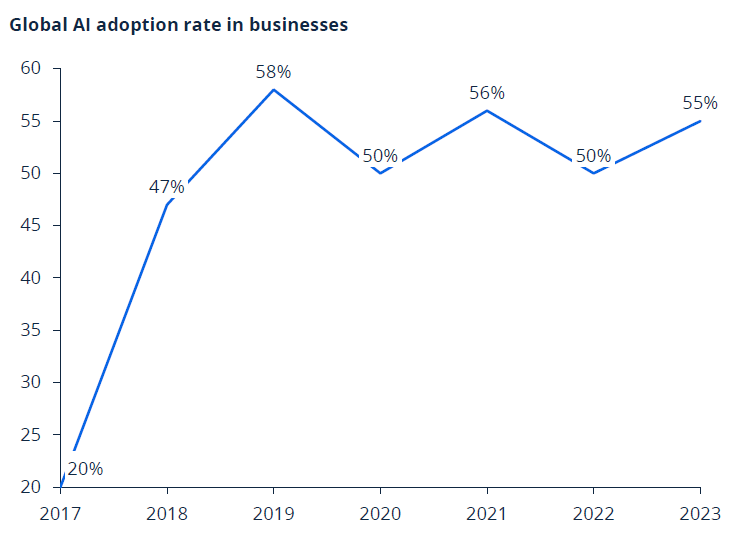Enteprise AI: Why Trust is Essential for Success
Global Enterprise AI markets are expected to surpass $270 billion USD by 2032, according to research by Statista in April 2024. That’s a a compounded annual growth rate of 44.1% (Statista, 2024). To state that enterprise AI is reshaping how businesses operate, is an understatement. From automating workflows to improving customer service, to streamline processes, and make ultimately making critical decisions on their own, AI has the power to unlock vast potential. But with this power comes responsibility—responsibility that hinges on trust.
 (source: Statista, “Artificial Intelligence: In-Depth Market Analysis”, p15, April 2024)
(source: Statista, “Artificial Intelligence: In-Depth Market Analysis”, p15, April 2024)
Trust is not just a buzzword. Trust is the foundation of any successful enterprise AI implementation. Without it, even the most innovative solutions will fail to gain the confidence of employees, customers, and stakeholders. In fact, “Three out of five people (61%) across countries are wary about trusting AI systems, reporting either ambivalence or an unwillingness to trust” (KPMG, 2023). In this post, we’ll explore why trust is crucial to making sure enterprise AI solutions flourish. How can trust be earned? Why must it be sustained for long-term success?
The Critical Role of Trust in Enterprise AI
When businesses deploy AI systems at scale, they’re placing significant reliance on technology to manage key operations, make decisions, and interact with customers. This reliance demands trust. This is trust that AI systems will act ethically, produce accurate results, and uphold privacy and security. Thinking about today’s popular generative AI systems, it is clear that hallucinations, poisoned data challenges, and bias answers to questions – do not help build this trust. Organizations need alternatives to the existing models.
The very nature of AI involves processing vast amounts of data and generating outputs that affect business outcomes. Whether the AI is automating customer service, analyzing financial data, or recommending business strategies, stakeholders need to trust that it will operate reliably and transparently. Creating systems that build human trust, is critical deeper adoption. Trust is the bridge between AI’s potential and its real-world impact.
Integration and Scalability: Trust Through Transparency
One of the biggest advantages of enterprise AI level systems is their ability to integrate with existing platforms like CRM, ERP, and others. It can streamline workflows, automate tasks, and scale across multiple departments, making businesses more agile and efficient. With the global AI adoption rates in businesses hovering around 55% in 2023 (Statista, 2024), the trick for organizations is increasing employee uptake, by making them more trustworthy.
 (source: Statista, “Artificial Intelligence: In-Depth Market Analysis”, p21, April 2024)
(source: Statista, “Artificial Intelligence: In-Depth Market Analysis”, p21, April 2024)
Knowledge Management and Data Integration
Enterprise AI is often used to manage and retrieve vast amounts of knowledge. By leveraging stable and reliable tools like knowledge graphs, AI can connect previously siloed data, providing users with timely, relevant, and trusted information. To build trust in these systems, employees need to see transparency in how the AI retrieves and processes data. It also has to be built on building systems that use human-in-the-loop systems to ensure critical information is pre-screened to ensure it is accurate. Finally, when selecting an enterprise AI solution, you need to ensure that it does not succumb to hallucinations, poisoned data, insert bias, or provide culturally offensive answers.
For an in-depth look at AI system considerations for Knowledge Management solutions, read “Knowledge Management in the Virtual Agent Era”. This is a completely free ebook (no form fills, no questions, no strings attached), that guides the reader through the needs of Responsible AI solutions that build employee and customer trust. See also our shorter article on intelligent virtual agents.
Automation and Robotic Process Automation (RPA)
AI’s ability to automate repetitive and time-consuming tasks is one of its most appealing benefits. By taking over tasks such as customer support, HR requests, and financial workflows, AI allows human employees to focus on more strategic initiatives. As such, enterprise AI through Robotic Process Automation (RPA), can transform mundane processes like data entry, invoicing, and even HR tasks. But automation without trust leads to resistance. Employees need assurance that AI will complete tasks correctly, and will provide accurate information, every time. These are excellent examples where Graph AI based system excel, like those developed by kama.ai. Businesses must rigorously test and validate their systems, and build human-in-the-loop processes to provide guidance, ensure accuracy, and help train our new virtual agents.
Is Trust Really that Important?
Think this through for a moment. If an enterprise AI systems does not provide accurate answers every single time, then it means that employees may use that information to make incorrect decision. Doing so will inevitably require the employee to later correct the problem where the incorrect information was used. That creates extra work. When our corporate minds are focused on efficiency and effectiveness… this means the employee will have learned NOT to trust the system that may have hallucinated – providing the wrong answers.
In these cases, either associates distrust the new solutions, or reduce efficiency by continually double-checking data with other sources. Either way, this goes back to the earlier statistics pointing out that AI adoption still hovers around only 55% within corporations. To improve this adoption, we need to start using the right, and reliable technology, for the appropriate tasks.
 Human-Centered and Ethical AI
Human-Centered and Ethical AI
Building trust in enterprise AI goes beyond performance. It also requires an ethical foundation. This is especially true if your organization is connecting your solution to outward, customer facing systems like chatbots, or information systems for customer service representative. Here, human-centered AI ensures that systems are designed to complement human efforts, not replace them. In other words, use the system to take away the mundane, highly repetitive jobs, allowing your employees to focus on the complex and strategic challenges. But such system need accuracy, a human handoff mechanism for complex problems, and a sense of ethics. All this ensures your brand is safe with such a solution.
An example of an externally facing system that has done this well is that of Canadore College. Speaking about their use of Enterprise AI virtual agents, Joshua Willard, Manager – Marketing for Canadore College, stated “we’re improving our ability to provide information that’s not just accurate but also empathetic and true to who we are.” Read more on Canadore College chooses kama.ai
If your organization is thinking about using an AI Agent that is customers facing, speak with a kama.ai expert first. A short no pressure discussion will save you angst, by choosing a solution that is accurate, adheres to Responsible AI practices, and best of all, lets you sleep at night.
Ethical AI and Fairness
Not often considered by most AI vendors is the importance of your corporate values. Enterprise AI systems need to reflect the values of the organizations that use them. Ethical AI has to minimize bias, promote fairness, and ensure that any decision-making is closely aligned with human operators for complex challenges. Trust comes from knowing the systems are built to act responsibly and ethically, avoiding unfair or biased outcomes.
Transparency and Human Processes
Operating as a “black box” does NOT garner trust. Employees and decision-makers need to understand how AI reaches its conclusions, especially when the stakes are high. For major challenges, there has to be a handoff process, or method that bring human decision making, into the equation. The transparency of knowing that these systems are built-in, demystifies the entire virtual agent process. This builds trust with your teams, and helps improve adoption within the organization.
Conclusion: Trust Fuels the Future of Enterprise AI
The future of enterprise AI holds immense promise. It is already driving operational efficiency, boosting scalability, and automating complex processes at unprecedented levels. But, for these benefits to be fully realized, trust must be at the foundation of every AI deployment. Trust isn’t just a checkbox; it’s a dynamic, evolving element that needs to be nurtured and sustained over time.
To build and maintain this trust, businesses must emphasize transparency, ensuring that AI processes are understandable and explainable. Ethical practices must be at the core, with AI systems designed to act responsibly, minimize bias, and align with the organization’s values. More importantly, the AI systems have to be smart enough to realize when a complex problem is presented, that a human must be brought into the loop to resolve the situation.
Ultimately, the power of enterprise AI is only as great as the trust it earns. With global AI adoption in businesses currently at 55% (Statista, 2024), the road to increasing that number lies in addressing the concerns of employees and stakeholders. When businesses commit to transparency, reliability, and ethical AI practices, they set the stage for long-term success. In the evolving landscape of enterprise AI, trust is not just an asset—it’s the cornerstone of sustainable innovation.
Give us a call for a quick discussion about how a kama.ai solution meets these pain points, and could be the ideal solution for your needs. When it needs to be right, it needs to be kama.ai.
